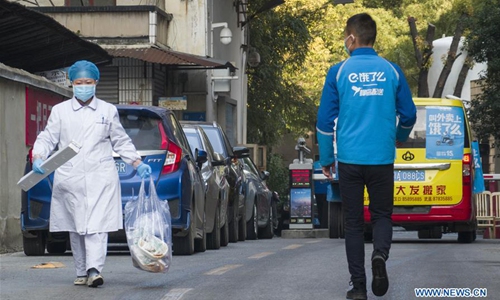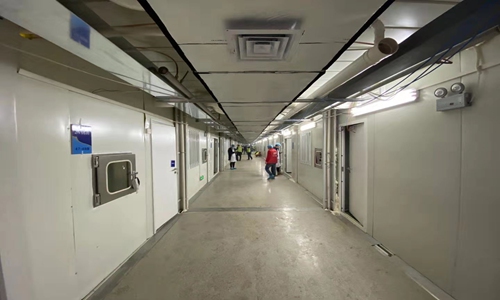Huanggang worried to be next Wuhan
Huge unpredictable crisis tests China’s grass-roots governance

A takeaway deliveryman passes by a medical worker at a hospital in Wuhan, central China's Hubei Province, Jan. 31, 2020.
Huanggang, a city neighboring epicenter Wuhan in Central China's Hubei Province, recorded a significant increase of confirmed coronavirus cases, expected to be over 1,000 on Sunday and Monday. Local authorities were grilled about whether the prefecture-level city would become the next epicenter as major flaws were exposed amid the coronavirus battle regarding grass-roots social governance.
Authorities in Hubei reported on Sunday morning that there has been an increase of 1,921 new cases of infection on Saturday in the province, and Huanggang remained the second worst affected area regarding confirmed cases, as much of its 7.5 million population are outbound workers. Ahead of Wuhan's lockdown on January 23, about 600,000 to 700,000 people have returned to Huanggang, such massive migration made implementation of disease prevention and control measures more challenging, according to local officials.
A local resident surnamed Yuan in Huanggang told the Global Times that she hasn't gone out for eight days, and her whole family is scared when the ambulance siren sounds, constantly penetrating the deadly silence of her community.
Yuan's father, who works in a local hospital, said that the hospitals are in desperate need of medical and protective resources, as most of the donations go to Wuhan, about 140 kilometers away from Huanggang, and also the epidemic center.
"Please give Huanggang some of your love and generosity bound for Wuhan," urged a Huanggang volunteer surnamed Qing.
Since the city lockdown, Wuhan, with confirmed cases of 4109 as of Sunday morning, has attracted the most attention as it is also the key battleground of fighting the deadly disease. However, other second and third-tier cities in the province have been facing more difficulties due to problems such as less developed healthcare systems, inefficient emergency responding mechanisms and lack of transparency in information disclosure, but they have been blind spots in the nationwide anti-virus campaign.
Some residents were not aware of the spreading epidemic at the early stage due to the lack of relevant information, and some did not take it seriously, several local residents told the Global Times. "I went to a local hospital for treatment on January 15, many did not wear masks," a local resident surnamed Liu who studies in Zhengzhou, Central China's Henan, told the Global Times on Sunday.
As the situation is getting more severe, Huanggang has also implemented a city-wide lockdown and imposed transport restrictions. Liu has to stay at home now waiting for further instructions on when to return to his school.

The image shows the internal corridor of the SARS treatment-model Huoshenshan Hospital in Wuhan, Hubei Province. On Sunday, the hospital was officially opened to army medical workers. The total area of the hospital is about 50,000 square meters and the total construction area is 33,940 square meters. It contains a total of 1,000 beds (See story on Page 4). Photo: CNS Photo
Fighting the battle
Over the past week - during the Spring Festival holidays, Huanggang has been ramping up efforts in fighting the battle by banning private vehicles from using, launching tight community registration to track down household health conditions, conducting full-scale preventive measures like disinfecting and cutting sources of infection.
Amid the city lockdown, local authorities imposed stricter restrictions on movements of local residents. For example, each household can designate one family member to purchase daily necessities in every two days, which, analysts said, are rare city management policy.
Local authorities also enforced discipline by punishing 337 officials for slacking off from their duty, six of whom were dismissed from their position.
A video went viral on Chinese social media in the past few days, which recorded health officials bumbling when asked by the central government supervision team how many patients and hospital beds the city had, triggering an online uproar over the city officials' negligence amid the epidemic. The lack of publicly available information and low awareness of the disease led to a lack of vigilance, causing a surge of infection cases, experts said.
"When I came back to my mother-in-law's house the day before the Wuhan lockdown, I went to a local supermarket and saw many did not wear masks," she said, noting that local residents realized the seriousness of the disease very late and local authorities released very little information related to the epidemic.
A local resident surnamed Chen said that her residential community has had 10 confirmed cases of coronavirus infection and has been locked down. "One member of the household can only go outside for grocery shopping once every two days. We have to report to the building's manager and the community office for approval," Chen said.
Although the tough situation in Huanggang has brought many inconveniences to the local people, according to the video they sent to the Global Times, the foods and other necessities of life in the supermarkets are in sufficient supply for the need of the local residents, and no one worries about the shortage of necessities.
In order to reduce outdoor activities of the people in Huanggang, the Huang Shuang Group, an enterprise that owns several local major shopping malls and supermarkets, also provides food delivery service to different communities of the city, said a statement issued by the enterprise uploaded online.
The prices of the foods remain normal and didn't see a sharp rise due to the crisis, according to the locals.
Lesson for local governance
Considering worsening situation of Huanggang, both central and local governments raised emergency responding level to the highest, and the central government also sent inspection team to the prefecture-level city to ensure the implementation of preventive and control measures more efficiently. When the city was plagued by the epidemic, some residents said they have been warmed by people's kindness, with a large number of volunteers contributing ideas and money to their hometown.
However, management problems also emerged in reaction to the infection, for example, when the city's officials heard some cities have stopped traffic lights, they immediately followed and turned all lights to red. However, they withdrew the order two hours later, said another resident surnamed Zhan. Such rushed, top-down decision-making process also exposed deep flaws in local governance.
"Even ordinary people have a clear picture of the numbers of infected cases and materials the hospitals need, they [the local officials] don't know anything," Yuan said.
When talking about the problems found out through the central inspection group amid the anti-virus battle in Huanggang, the city mayor Qiu Lixin told a press conference on Saturday that local officials indeed felt very guilty and blamed themselves for inadequate preparation for the epidemic, inadequate prevention and control measures, and some local officials' poor working performance.
Some Chinese experts told the Global Times that the unpredictable crisis is deemed as a full-scale test of China's local and grass-roots governance. "Politics cannot influence the virus. If the local government takes inadequate measures in virus containment, the negative effects will soon emerge," Liu Yuanju, a research fellow at the Shanghai Institute of Finance and Law, told the Global Times.
It also reflected some grassroots government's deep-rooted formalism and lack of overall coordination, said Liu, citing cases where local governments ordered traffic closures and retracted the decision hours later. "They were afraid they will be reprimanded if they didn't take any action; but after they made the decision, they found it wasn't not feasible in some ways."
A Beijing-based expert, who requested to be anonymous, said that the Huanggang government's flaws exposed in combating the virus, indicate there's still room for grassroots government to improve to realize governance modernization.
Some local governments should be more pragmatic, seek truth from facts and avoid lip service, and most importantly, open more channels to enhance their communication with the people, said the experts.


